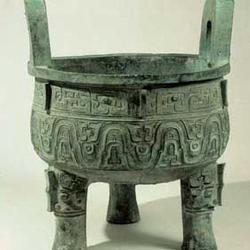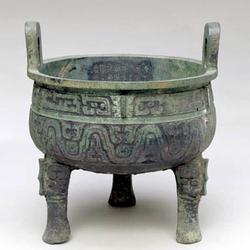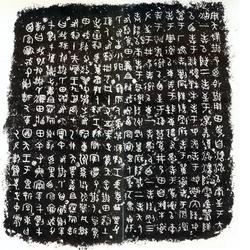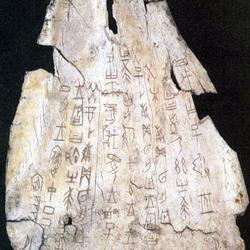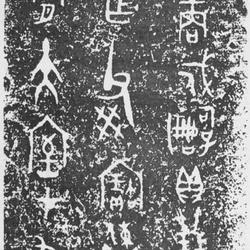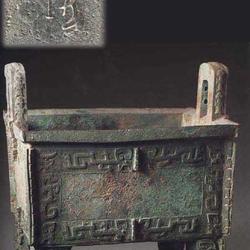The large tripod is 101.9 cm high and 77.8 cm in diameter. It is round, with erect ears, deep belly, three-column feet, and the neck and upper parts of the feet are decorated with animal face patterns. It is a sacrificial vessel made by a nobleman during the reign of King Kang. It is said that it was unearthed in Licun, Qishan, Shaanxi in the early years of Daoguang's reign in the Qing Dynasty.
The large tea tripod has a majestic shape and exquisite craftsmanship. There are 19 lines of 291-character inscriptions cast on the inner wall, describing the events in which King Kang ordered the men to manage the army and gave him wine, uniforms, carriages and horses, and more than 1,700 slaves. This is an important historical material for studying the slavery system of the Western Zhou Dynasty. When the original instrument was unearthed, it was owned by Song Jinjian, a wealthy gentry in Qishan. Later, due to the family's decline, the tripod was transferred to Xi'an by his descendants for 700 taels of silver. Later, it was once owned by Zuo Zongtang. A few years later, Zuo Zongtang gave this tripod as a gift to Pan Zuyin in gratitude for his kindness. Since then, the large pot has become a treasure passed down from generation to generation and is kept in the lobby of the Pan family in Suzhou. It was dedicated to the country by Pan's descendants in 1952 and is now stored in the Chinese History Museum.
The inscription records that King Kang described to Yu the experiences of King Wen and King Wu of Zhou in founding the country. It is believed that King Wen and King Wu were able to establish the country with outstanding achievements mainly because their subjects never drank too much and were serious and respectful during sacrifices. The lesson of King Shang's fall was that he was addicted to alcohol. From this, Yu was warned to follow the example of his ancestors and loyally assist the royal family, and was given military uniforms, chariots and horses, wine, state officials, and people. Yu's inscription explains that this tripod was also made to worship his grandfather Nangong. The inscriptions on the Great Meng Ding are important historical materials for historians to study the feudal system of the Zhou Dynasty and the relationship between the Zhou king and his subjects. They have always been valued by historians.
The big Yu Ding is also called the Yu Ding. The reason why it is named "big" is to distinguish it from the small Yu Ding. These two tripods were produced at the same time, but the original small cup tripod has been lost, and only the inscription rubbings remain.
Vernacular translation of the inscription on the Great Cauldron:
In September, the king registered his fortune in Zongzhou. The king said this: "The great and wise King Wen accepted the great mission of God's help. When he came to King Wu, he succeeded King Wen and established the Kingdom of Zhou. He eliminated the evil, generally preserved the land in the four directions, and governed the people for a long time. The people who do things No one dares to get drunk during the drinking ceremony, and no one dares to get drunk during the sacrifices such as chai and yang. Therefore, the emperor of heaven protects the late king with his loving heart and vigorously protects the late king and makes him universal. I heard that The Yin Dynasty lost its great destiny given by heaven because the Yin Dynasty, from distant princes to officials of all sizes in the court, often drank too much, so it lost the world. You inherited the prominent position of your ancestors when you were young, and I asked you to Studying in my noble primary school, you must not betray me, but assist me. Now I will imitate King Wen's decrees and virtues, and appoint two or three ministers to appoint you just like King Wen did. You must coordinate the rules and disciplines respectfully, and work diligently morning and evening. Serve admonitions, perform sacrifices, attend to the king's affairs, and fear the majesty of heaven." The king said, "I order you, Yu, to follow the example of your ancestor Nangong." The king said, "Yu, you must assist me in managing the army, and be diligent and diligent. Handle the cases of rewards and punishments in a timely manner, and assist me in governing the four directions from morning to night, and help me govern the people and the territory according to the system of the previous kings. I will reward you with a bottle of fragrant wine, a turban, a knee cap, wooden shoes, a cart, and a horse; I will give you the flag of your ancestor Nangong to use for hunting patrols, four officials of your country, and 659 people ranging from masters to common people; "I will give you thirteen kings and ministers of foreign races. There are one thousand and fifty barbarians, and we must try our best to make these people work hard on the land they cultivate. The king said: "Yu, you must treat your ministry respectfully and do not disobey my orders." "Yu praised the king's virtues and made a tripod in memory of his ancestor Nangong in the 23rd year of King Kang's reign.
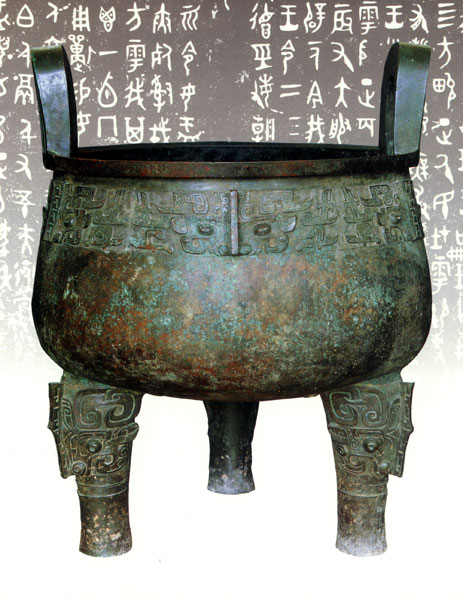
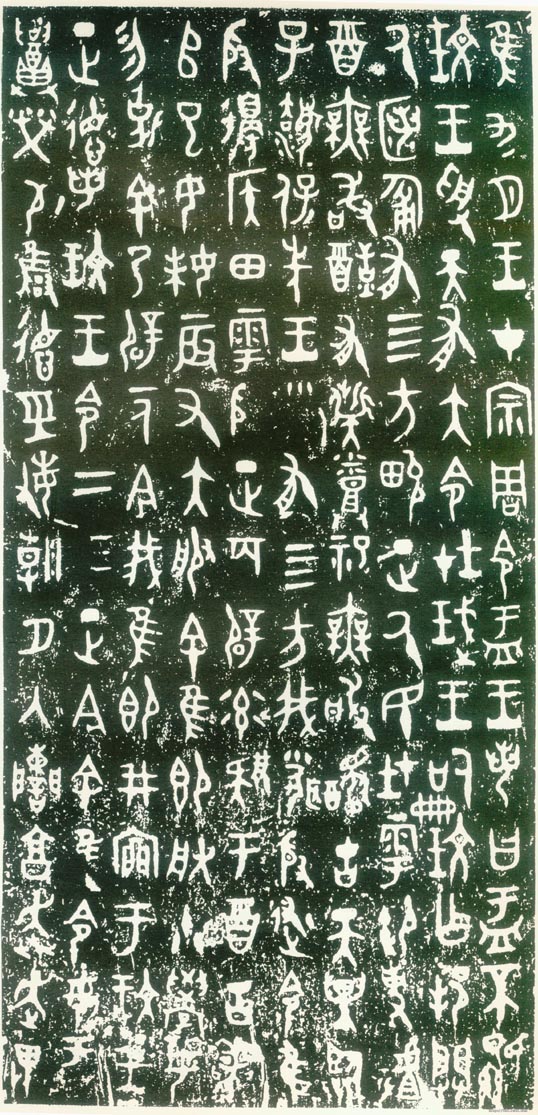

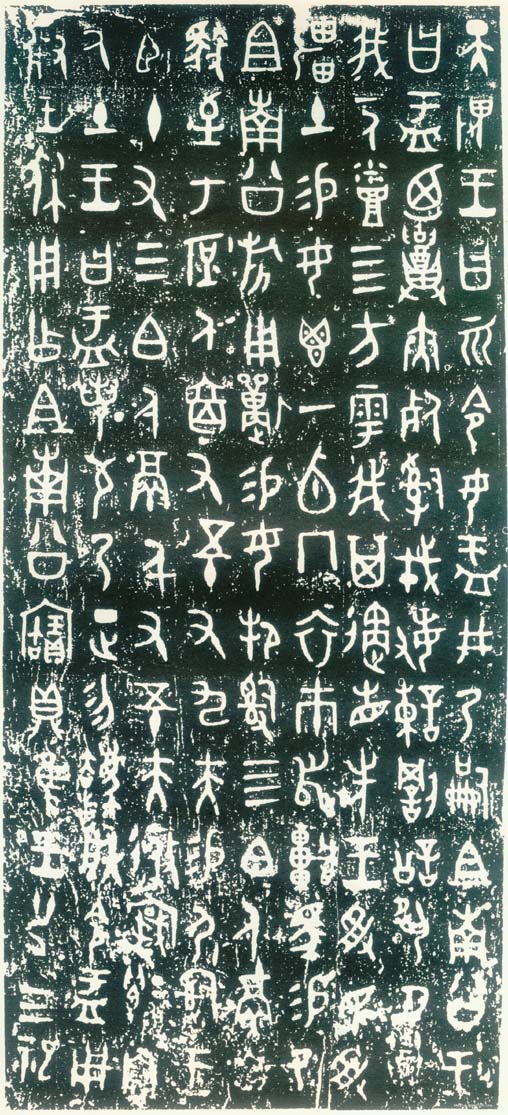

Part of the rubbing of "The Great Cauldron"
Its calligraphy style is rigorous, the shape and layout of the characters are very simple and plain, and the brush strokes are both square and round. It has a solemn and solemn artistic effect. It is a representative work of gold calligraphy in the early Western Zhou Dynasty.

